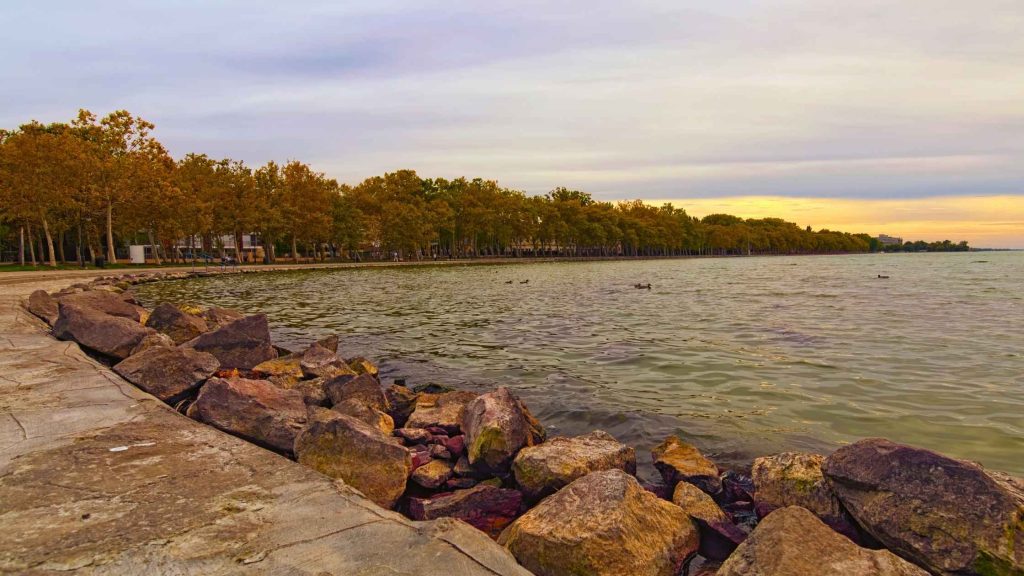We’ve just come out of a long weekend of remembrance for the 1956 Revolution, and I ended it with something more joyful – celebrating my mother’s 80th birthday at DNB Budapest, surrounded by family and the kind of food that makes you grateful to live here. The Danube shimmered in the background, and for a moment, everything felt still.
My post about the Revolution last week struck a nerve – hundreds of you shared memories, family stories, and reflections across my social media. Reading them reminded me how identity in Hungary isn’t abstract. It’s lived, argued, celebrated, and occasionally legislated. Which brings me neatly to today’s topic: Balatonföldvár. Because Hungary’s Local Identity Protection Law – the property regulation I’ve been following all year – has now reached Lake Balaton. And that changes everything.
Balatonföldvár’s New 2% Rule
Starting 5 November 2025, anyone buying a home in Balatonföldvár with the intent to settle will need to pay a 2% “settlement contribution” to the local council.
For a home worth HUF 107 million (€275,000), that’s an additional HUF 2.1 million (€5,400) on top of the purchase price.
The stated goal is to fund the maintenance of public areas, parks, and local infrastructure – protecting what the decree calls the town’s “community identity.” The measure also introduces pre-emption rights for both the municipality and local residents if a sale serves the public interest, such as local housing.
Non-compliance could cost you 0.2% of the purchase price in fines for “unlawful settlement.”
Why This Is a Turning Point
For months, I’ve covered Hungary’s evolving property regulations under the Local Identity Protection Law (Településvédelmi törvény). Until now, these rules were mostly seen in small rural villages. The move to Balatonföldvár, however – a popular resort town – marks a major shift:
- From remote municipalities to high-profile tourism regions.
- From small fixed fees to percentage-based contributions tied to property value.
- From quiet local measures to visible national precedent.
It’s a first for Lake Balaton, and that visibility will almost certainly spark more councils to follow suit.
The Legal Debate
Experts are divided. Some argue these local decrees strengthen communities and help fund maintenance. Others caution that they may exceed what the law allows.
The Local Identity Protection Law was designed for in rem (property-based) instruments like pre-emption rights, not personal financial obligations tied to buyers. Government reviews are already underway, and any decree found inconsistent with the statute may need to be amended or repealed.
It’s Not Just Balatonföldvár
Across Hungary, dozens of municipalities are introducing similar rules—some even stricter. These include requirements for:
- Secondary education or vocational qualifications
- Clean criminal records and no public debt
- Regular income or insurance coverage (often 365 days’ proof within two years)
- And in several places, Hungarian language proficiency
To help make sense of it, I’m sharing a verified county-by-county list compiled by *******@******al.hu“>Dr. Mariann Minkó-Miskovics, lawyer at MMM Legal.
The PDF details every municipality currently enforcing settlement restrictions, fees, or conditions – ranging from HUF 5,000 to HUF 1.5 million, with fines for “illegal settlement” averaging HUF 200,000.
You can download the verified document here:
👉 Download the list of affected municipalities (PDF)
Examples from the List
- Rajka (Győr-Moson-Sopron): Up to HUF 1.5 million per property, fines for illegal settlement.
- Győrújbarát (Győr-Moson-Sopron): HUF 1.5 million/property, effective 1 October 2025.
- Pilis (Pest): Language and income criteria, HUF 100,000/person, with administrative fines for incomplete applications.
Many forms are available only in Hungarian, and some towns require proof of a minimum 10–20 sqm per person or recent employment history.
Source: Verified list compiled by Dr. Mariann Minkó-Miskovics, MMM Legal (2025).

Balatonföldvár introduces a 2% settlement fee under Hungary’s property law.
If You’re Buying or Moving
- Budget for the 2% – include it in your completion costs and confirm payment details with your notary.
- Check eligibility early – confirm local requirements for education, insurance, and income before applying for an address card.
- Expect Hungarian-only paperwork – most councils do not yet provide English versions.
- Avoid fines – missing forms or unapproved settlement can cost HUF 200,000 or more.
Further Reading
If you’re just discovering this issue, you can follow my full coverage of Hungary’s property law evolution:
- Hungary Property Law 2025
- Hungary Property Law: Identity Protection
- Hungary Identity Protection Property Law
- Hungary Property Law Impact
- Hungary New Property Law Is Here
- Identity Protection Law Alsóörs: Hungary’s First Case?
FAQ
Does the 2% Balatonföldvár fee apply to everyone?
The contribution applies to property buyers who intend to establish residence in Balatonföldvár – those applying for a local address card. Buyers who keep the property as a secondary or holiday home without registering an address may not be affected, though local interpretation could evolve.
Is this legal under Hungary’s property law?
That’s under review. The law permits local identity protection measures, but financial conditions may exceed its intended scope.
Where can I find out if my town has similar rules?
Download the verified list compiled by Dr. Mariann Minkó-Miskovics of MMM Legal for the full breakdown.
Update: The First Budapest District Joins In
Since publishing this article, it’s been confirmed that Budapest’s 16th District (XVI. kerület) will also apply the Local Identity Protection Law from January 2026. According to 24.hu, citing Ingatlan.com, the district will introduce a municipal right of pre-emption on the sale of partial ownerships and set new limits on address registration.
Residents will no longer be able to register a residential address in non-residential buildings, and no more than seven people may move into undivided jointly-owned suburban properties that meet local standards.
Unlike the Balatonföldvár decree, this version focuses less on financial contributions and more on urban-planning control – curbing the spread of illegally converted outbuildings and maintaining the suburban character of the district.
Personal Reflection
After a long weekend spent reflecting on courage, resilience, and community, it feels especially fitting to be writing about a law that, in its own way, is trying to define who belongs. My mother’s 80th birthday celebration yesterday was a joyful reminder of continuity – the laughter of different generations, the familiar view of the Danube, and the shared stories that link where we come from to where we are.
The messages I received after posting about the 1956 Revolution were extraordinary – hundreds of people writing from across Hungary and beyond, sharing memories of grandparents, neighbours, and cities that rebuilt themselves out of defiance. Reading through them this week, I couldn’t help thinking that the conversation about identity we keep having online is now playing out in legislation, too.
With Balatonföldvár now joining the list of towns invoking the Local Identity Protection Law, we’ve entered a new chapter. This isn’t just about obscure rural councils; it’s about how Hungary’s most visible communities – our lakeside towns, tourist hubs, and residential areas – are responding to change. What began as a policy aimed at protecting cultural identify has reached the country’s favourite holiday shoreline, and with it, a new level of scrutiny.
I’ll continue following these developments closely – tracking which municipalities take similar steps and how the government’s review process unfolds. For now, the questions are as complex as ever: What does “protecting identity” really mean? Who gets to define it? And how do we balance local pride with national and international fairness?
The Story Isn’t Over Yet
As always, I’ll keep sharing updates here on HOW TO HUNGARY, in plain language and with context. And if you’ve seen similar regulations discussed in your own town – or have personal experience navigating them – I’d love to hear from you. This is one of those conversations that touches everyone who calls Hungary home, whether permanently or just for part of the year.
And don’t forget to Sign up for my FREE monthly newsletter – the HOW TO HUNGARY Insider. Living in a new country is never simple, but it doesn’t have to be overwhelming. Each month, I share the latest Hungary updates, expert advice, personal insights from someone who’s actually done it – and absolutely no hidden agendas.

Anikó Woods is a Canadian-Hungarian writer, technology specialist, and digital strategist who swapped Toronto traffic for Hungarian bureaucracy. She’s the creator of HOW TO HUNGARY: Budapest & Beyond. Since moving to Hungary in 2017, she’s been deep in the paperwork trenches – fact-checking, interviewing experts, and helping others make sense of the madness. Her writing turns chaos into clarity, with a few laughs (and wine recommendations) along the way.

0 Comments